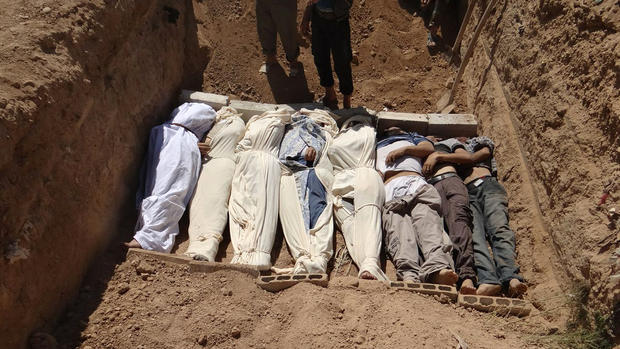Obama administration set to release Syria intel report
Updated 5:20 a.m. ET Aug. 30, 2013
WASHINGTON
The administration will release on Friday a declassified version of its intelligence report on last week's purported Syria chemical weapons attack, a senior administration official told CBS News late Thursday.
The official also said the administration would go public with its legal justification for taking military action against the Syrian regime if and when President Obama orders a strike.
Mr. Obama might do so even though it would have to come without the backing of Washington's closest ally, the White House has indicated to CBS News.
Hopes that Britain would join any U.S. military action were dashed late Thursday when Prime Minister David Cameron lost a non-binding vote in the House of Commons to endorse that policy -- a stunning rebuke.
The administration expects to have rhetorical support from many nations but no longer considers British military participation vital, feeling it is preferable, but not necessary. "We don't have to wait for them," a senior administration official told CBS News. "We want to be helpful, but we'll act on our own decision-making."
British reticence places the Obama White House in an awkward position, aides conceded. It must now decide whether to carry out a military strike to uphold an international norm against chemical weapons use that even America's staunchest ally is unwilling to support.
Top officials said Mr. Obama's intent to carry out a limited attack -- "a shot across the bow" in the president's words -- means broad international support and congressional authorization are preferred but not necessary. The U.S. will seek as many allies as it can and consult regularly with members of Congress but will act rapidly, aides said, to drive home the point that the mass use of chemical weapons will always be punished.
"The use of weapons of mass destruction is a threat to our interests because it makes a mockery of international rules of the road that matter," a senior official said. "This isn't Iraq where we were trying to prove the existence of weapons to launch an open-ended ground invasion. This is chemical weapons use on a mass scale that we are considering a limited, targeted response to."
There is also a signal intended in the limited scope of the military attack on Syria, the senior official said.
"It's a statement of U.S. policy that frankly sends a message to the international community that we're not going whole hog here," the senior official said. "Even limited U.S. action has a big impact. We're not going to take Assad out. But anything we do is going to degrade him in a way that nothing the opposition does."
Earlier, the White House pushed back on skepticism about potential U.S. military action in Syria, saying the evidence that the Syrian government used chemical weapons against civilians is "very convincing" - and that the use of chemical weapons is a violation of a "critically important international norm" that must carry with it serious consequences.
Still, White House spokesman Josh Earnest emphasized that Mr. Obama is "not contemplating an open-ended military action," describing the responses under consideration as "very discrete and limited" in their scope.
"We want to make sure that a response sends an unambiguous signal to [Syrian President Bashar Assad's] regime and to dictators around the world that living up to these international norms is the firm expectation of the international community, and that failure to do so has serious consequences," Earnest explained.
On Thursday evening, the administration held a conference call for members of Congress to lay out the unclassified intelligence report about chemical weapons use in Syria.
Democratic House Minority Leader Nancy Pelosi issued a statement: "On the call, I agreed with Speaker Boehner and other Members who stated that there needs to be more consultation with all Members of Congress and additional transparency into the decision making process and timing, and that the case needs to be made to the American people.
"It is clear that the American people are weary of war. However, Assad gassing his own people is an issue of our national security, regional stability and global security. We must be clear that the United States rejects the use of chemical weapons by Assad or any other regime."
"Tonight the Administration informed us that they have a 'broad range of options' for Syria but failed to layout a single option," said Oklahoma GOP Sen. Jim Inhofe in a statement. "They also did not provide a timeline, a strategy for Syria and the Middle East, or a plan for the funds to execute such an option. Several members agreed with me that whatever is decided upon, it's going to take military resources that are at decreased readiness levels due to a lack of funding."
The administration expects to have rhetorical support from many nations because it no longer considers British military participation vital. It is preferable, but not necessary. "We don't have to wait for them," a senior administration official told CBS News. "We want to be helpful, but we'll act on our own decision-making."
British reticence places the Obama White House in an awkward position, aides conceded. It must now decide whether to carry out a military strike to uphold an international norm against chemical weapons use that even America's staunchest ally, Great Britain, is unwilling to support.
Top officials said Mr. Obama's intent to carry out a limited attack - "a shot across the bow" in the president's words - means broad international support and congressional authorization are preferred but not necessary. The U.S. will seek as many allies as it can and consult regularly with members of Congress but will act rapidly, aides said, to drive home the point that the mass use of chemical weapons will always be punished.
"The use of weapons of mass destruction is a threat to our interests because it makes a mockery of international rules of the road that matter," a senior official said. "This isn't Iraq where we were trying to prove the existence of weapons to launch an open-ended ground invasion. This is chemical weapons use on a mass scale that we are considering a limited, targeted response to."
There is also a signal intended in the limited scope of the military attack on Syria, the senior official said.
"It's a statement of U.S. policy that frankly sends a message to the international community that we're not going whole hog here," the senior official said. "Even limited U.S. action has a big impact. We're not going to take Assad out. But anything we do is going to degrade him in a way that nothing the opposition does."
Meanwhile, Earnest emphasized, as Mr. Obama did during an interview on Wednesday with PBS, that the administration has reached no final conclusion on the question of military action in Syria.
"I have not made a decision" on Syria, the president explained on Wednesday, but he said his administration has "concluded" that the Assad regime was responsible for the chemical weapons attack.
Earnest also rejected comparisons between the debate over intervention in Syria and an earlier debate about intervention in Iraq, which was attended by claims of chemical weapons possession on the part of the Iraqi regime that were proven untrue only after the U.S. had dissolved the rule of former Iraqi leader Saddam Hussein. "We're not talking about regime change here," he said. "We're talking about enforcing a critically important international norm."
"There is not a military solution to the broader conflict that is taking place in Syria," Earnest said.
Pressed on reports that suggest some level of uncertainty about who deployed the chemical weapons, Earnest brandished on-the-record statements from the president, Secretary of State John Kerry, and members of the Senate Intelligence Committee that betrayed no doubt that the regime is culpable for the August 21 use of chemical weapons that left hundreds of civilians dead.
"We already know from a previous intelligence assessment that the Assad regime has used chemical weapons against civilians in Syria. We know that the Assad regime maintains stockpiles of chemical weapons in Syria," he said. "We also know that it is the regime alone that has the capability to use the chemical weapons that were used...in the attacks that we saw on August 21st. We also know that the Assad regime was engaged in a military campaign targeting the specific regions where this chemical attack occurred."
The sum total of that evidence, Earnest said, presents a "very convincing" case that the Assad regime is responsible for the atrocities.
To further bolster that point, he cited intelligence reports from U.S. allies like Britain, France, and the Arab League who have "reached an assessment that dovetails with the assessment that we've conveyed to you."
- On Syria, Obama's words have done nothing but corner himself
- Syria chemical weapons attack blamed on Assad, but where's the evidence?
Critics have warned that, despite the horrific images emerging from Syria and the flagrant violation of international norms evinced by the use of chemical weapons, the United States has no pressing national interest in the Syrian civil war.
Earnest, however, reinforced the administration's conclusion that America has "significant" interests in the region, including but not limited to the safety of our allies, the safety of our facilities overseas, and the preservation of international norms prohibiting the use of weapons of mass destruction.
Some members of Congress have pushed for expeditious action in Syria, but others have counseled President Obama to seek the consent of Congress before deploying U.S. military assets in Syria, warning that failure to do so would violate the War Powers Act, which reserves for Congress the right to declare war.
Rep. Scott Rigell, R-Va., sent a letter to the president on Wednesday, signed by 116 members of Congress from both parties, urging the president to "to consult and receive authorization from Congress before ordering the use of U.S. military force in Syria."
Rep. Barbara Lee, D-Calif., joined by 53 other House Democrats, sent a similar letter to the president on Thursday, condemning the use of chemical weapons in Syria and urging the president to seek congressional approval before "committing any U.S. military engagement to this complex crisis."
House Speaker John Boehner also sent a letter to the president on Wednesday, urging him to explain the legal justification behind any decision to launch an attack, and demanding a "clear, unambiguous explanation of how military action...will secure U.S. objectives and how it fits into your overall policy."
Earnest promised that the administration would engage in "robust consultation" with the legislative branch as it seeks a way forward in Syria. The president spoke with Boehner on Thursday to detail the status of the deliberations on Syria.

